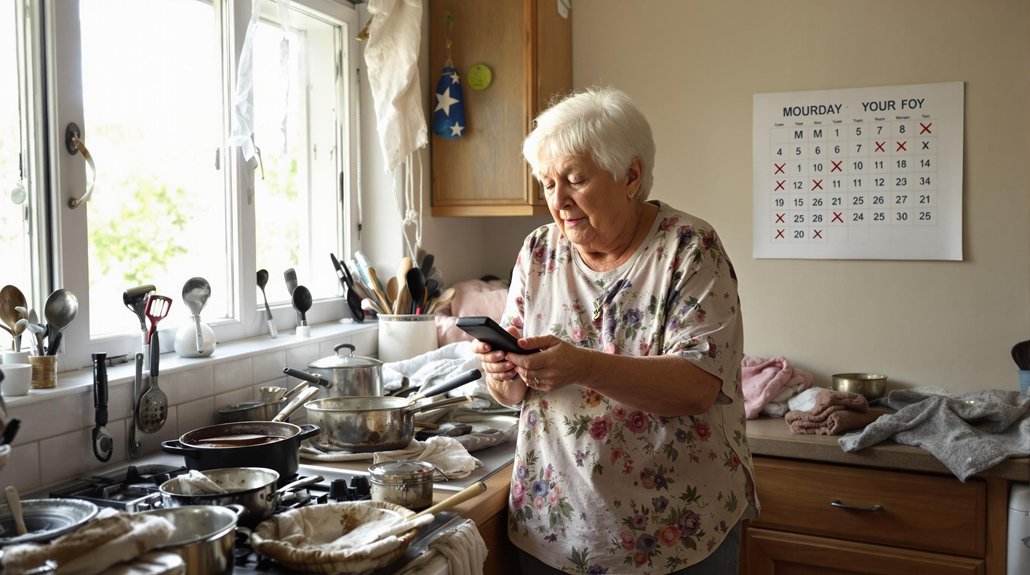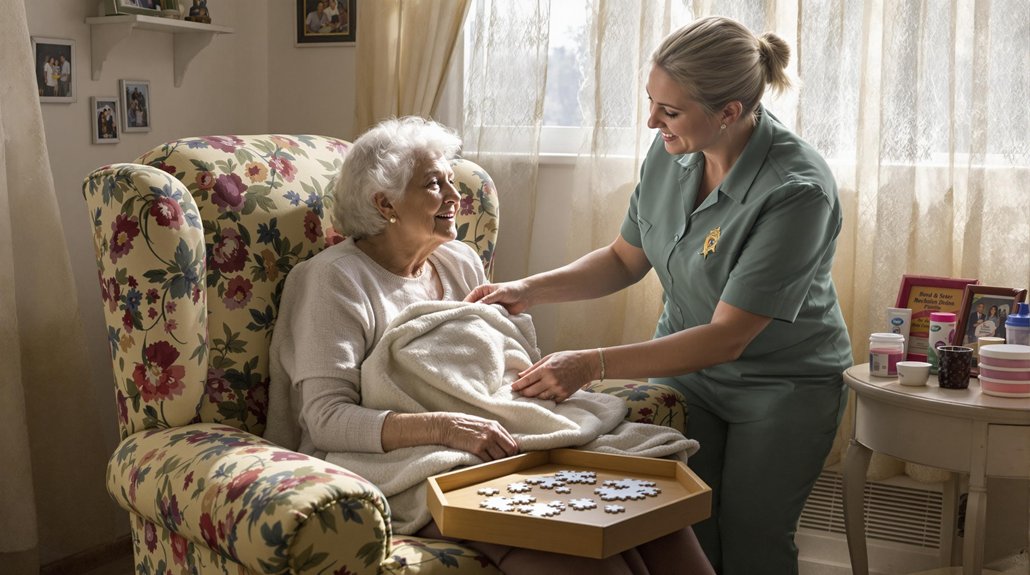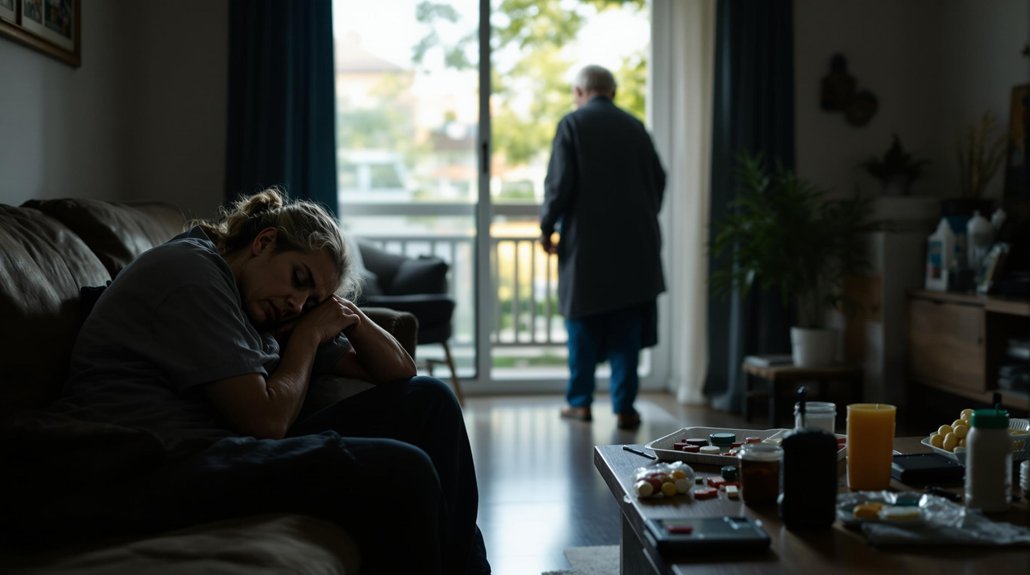You can definitely care for someone with dementia at home through proper planning and support. This option lets your loved one maintain dignity in familiar surroundings while receiving personalized care tailored to their needs. You’ll need to make important safety modifications, establish daily routines, and build a strong support network of family, friends, and healthcare professionals. Understanding the key elements of successful home care will help you make informed decisions for your situation.
Benefits of Home Care for Dementia Patients
While institutional care serves an important purpose, providing care for dementia patients in their own homes offers several compelling advantages.
Your loved one can maintain their sense of independence and dignity in familiar surroundings, which often reduces anxiety and confusion. You’ll be able to deliver personalized care that’s tailored to their specific routines, preferences, and needs.
Home care allows you to provide consistent emotional support through one-on-one attention that’s often harder to achieve in facilities. You can preserve family bonds and create meaningful moments together in a comfortable environment.
Your family member can continue participating in daily activities at their own pace, maintaining some control over their schedule. They’ll also have the comfort of their personal belongings, cherished memories, and established daily rhythms, which can help slow cognitive decline.
Professional dementia-certified caregivers can implement specialized cognitive support activities and safety monitoring while allowing your loved one to remain in their familiar home setting.
Essential Safety Modifications for the Home
Because dementia affects judgment and spatial awareness, adapting your home’s environment is crucial for preventing accidents and injuries.
Start by removing tripping hazards like loose rugs and electrical cords. Install handrails in hallways and bathrooms for fall prevention, and guarantee adequate lighting throughout the house, including night lights for evening navigation.
Safety first: Remove loose rugs and cords, add handrails, and ensure proper lighting to prevent falls in the home.
Secure potentially dangerous items such as medications, cleaning supplies, and sharp objects in locked cabinets. Place emergency plans in visible locations and program important phone numbers into speed dial.
Consider installing door alarms and monitoring systems to prevent wandering. You’ll also want to adjust water temperature settings to prevent scalding and add safety locks to windows above ground level.
These modifications will help create a safer environment for your loved one with dementia.
Working with trained dementia caregivers can help identify additional safety measures specific to your loved one’s cognitive stage and daily routines.
Building a Support Network for Home Care
Since caring for someone with dementia can quickly become overwhelming, establishing a reliable support network is essential for both you and your loved one.
You’ll need to identify family members, friends, and neighbors who can assist with daily tasks, provide respite care, or simply offer emotional support.
Connect with local support groups where you can share experiences, learn coping strategies, and gain valuable insights from others in similar situations.
Investigate community resources such as adult day care centers, meal delivery services, and in-home care agencies that can provide professional assistance.
Your local Area Agency on Aging can guide you to available services and programs.
Don’t hesitate to reach out to your loved one’s healthcare team, as they can connect you with additional resources and support services specific to dementia care.
Private duty nursing services can provide specialized medical support while allowing your loved one to remain comfortable at home.
Daily Routines and Activities Management
As dementia progresses, maintaining structured daily routines becomes essential for both caregivers and their loved ones. You’ll need to establish a daily structure that provides consistency while remaining flexible enough to accommodate changing needs.
Start each day at the same time and plan activities during your loved one’s most alert hours. Include simple engagement activities like sorting objects, listening to music, or looking through photo albums. Break tasks into manageable steps and allow extra time for completion.
You’ll find that predictable schedules help reduce anxiety and confusion. Create a visual calendar or checklist to track daily activities, meals, and medications.
Remember to balance active periods with rest times, and adjust activities based on your loved one’s abilities and interests. This structured approach helps maintain their dignity while making care management more manageable. Consider incorporating fall prevention techniques to ensure safety during daily activities and movement around the home.
Signs That Home Care May Be Appropriate
While daily routines help manage dementia care at home, certain behavioral changes and safety concerns may signal the need for professional home care support. You’ll want to monitor these key indicators in your loved one’s dementia symptoms and home environment to make informed decisions about care needs.
| Warning Signs | Impact on Daily Living | Action Needed |
|---|---|---|
| Wandering | Getting lost frequently | Supervision |
| Poor hygiene | Neglecting self-care | Personal care assistance |
| Unsafe cooking | Fire hazards | Meal preparation help |
| Falls | Injury risk | Mobility support |
| Medication errors | Missed or doubled doses | Medication management |
Watch for increasing confusion, agitation, or withdrawal from activities they once enjoyed. If you’re noticing these changes, it’s time to reflect on professional home care services to guarantee your loved one’s safety and well-being while maintaining their dignity in familiar surroundings. Skilled nursing services can provide expert medical attention and comprehensive care plans to ensure optimal comfort and safety for dementia patients at home.
Financial Considerations and Resources
Many families face significant financial challenges when providing dementia care at home. You’ll need to carefully evaluate your insurance coverage and explore additional funding sources to manage costs effectively. Medicare may cover some medical expenses, while long-term care insurance can help with daily care needs.
To maintain financial stability, implement budgeting strategies that account for both immediate and future care expenses. Start by documenting all current costs, including medications, safety modifications, and caregiving supplies.
Research financial assistance programs through your local Area Agency on Aging, veterans’ benefits if applicable, and charitable organizations. You might also consider consulting a financial advisor who specializes in elder care to help create a sustainable care plan.
Remember to investigate tax deductions available for medical expenses and home modifications related to dementia care.
Strategies for Caregiver Self-Care
Taking care of someone with dementia can quickly become overwhelming if you don’t prioritize your own wellbeing. To maintain your physical and emotional health, incorporate mindfulness practices and stress management techniques into your daily routine.
| Self-Care Activity | Benefits |
|---|---|
| Daily meditation | Reduces anxiety and improves focus |
| Regular exercise | Boosts energy and mood |
| Support groups | Provides emotional connection |
| Respite care | Prevents burnout |
| Hobby time | Maintains personal identity |
Remember that caring for yourself isn’t selfish—it’s essential. Schedule regular breaks, accept help from others, and don’t hesitate to reach out to support services. Practice deep breathing exercises when you feel stressed, and maintain social connections outside your caregiving role. You’ll be better equipped to provide quality care when you’re physically and emotionally recharged.
When to Consider Alternative Care Options
Even though home care is ideal for many dementia patients, you’ll need to recognize when it’s time to explore alternative options. Watch for signs like frequent wandering, aggressive behavior, or your loved one’s safety being compromised despite implementing security measures.
Recognizing when home care isn’t enough can be crucial. Safety concerns and behavioral changes often signal it’s time for alternative care options.
If you’re experiencing physical or emotional burnout despite utilizing support services, it may be time to reflect on changes.
Reflect on alternative care when your loved one requires round-the-clock medical supervision or when their care needs exceed your capabilities.
Watch for signs of declining health that demand specialized attention, such as difficulty swallowing, severe mobility issues, or complex medical conditions.
You might also explore partial alternatives like adult day care centers or respite care before shifting to full-time residential facilities, allowing for a gradual adjustment to new care arrangements.
Conclusion
Taking care of someone with dementia at home is like tending a garden – it needs daily attention, patience, and love. While it can feel overwhelming at times, many families successfully care for their loved ones at home with the right help and planning. Just as each person is unique, every care plan needs to be tailored to fit your specific situation.
You don’t have to figure everything out on your own. Think of your caregiving journey as a team effort, where experienced professionals can guide you every step of the way. Small changes in your approach can make a big difference in both your loved one’s comfort and your peace of mind.
Remember, asking for help isn’t a sign of weakness – it’s a sign of wisdom and love. Focus Family Care understands your challenges and is ready to support you with experienced, compassionate care that feels just like family.
If you or a loved one need help, don’t wait. Reach out to Focus Family Care today at (561) 693-1311 or email us at info@focusfamilycare.com.





